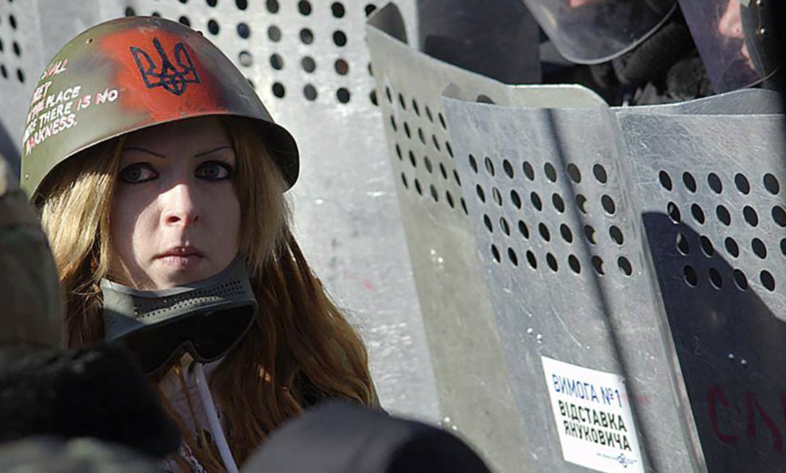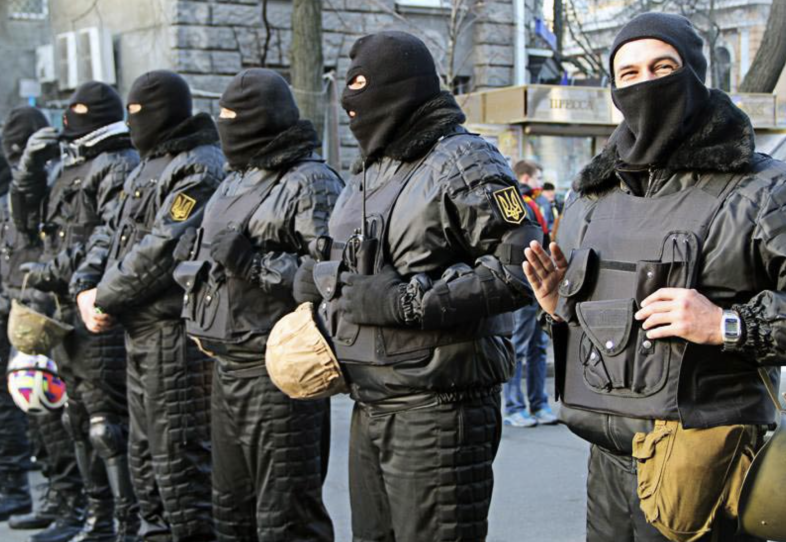Valeria Burlakova wears many hats – she’s a journalist, a writer, and a soldier. Her journey began in the trenches of Eastern Ukraine, where she bravely served in the Carpathian Sich volunteer unit. Transitioning to official military service, she became a member of the 93rd Separate Mechanised Brigade of the Ukrainian Armed Forces. Later, she rose to the rank of junior sergeant and assumed command of the mortar crew in the 54th Brigade. The Ukrainian Week publishes her reflections on the events of February 18, 2014, which left an indelible mark on Ukraine’s history.
The Maidan, especially the night from the 18th to the 21st of February, holds for me the essence that sometimes triumph can emerge even from the depths of crystal-clear despair.
From the despair that consumes you as you witness the wounded and the slain for the very first time in the heart of Kyiv. The main square of your city, which used to be so bustling on certain days that navigating through the crowds was a challenge, now rapidly empties out on the evening of February 18th. It clears out amidst urgent calls for “dear women and children to vacate Maidan Nezalezhnosti, or the Independence Square, where an anti-terrorist operation looms.” It empties amid the frenzied chants of one of Taras Chubay’s songs. It empties amidst the flames and gunfire.
You stay, but you also understand those who left. Because you don’t feel like you have the strength, resources, or capability to fight against the armed sea of black helmets. You have nothing to offer for resistance against the enemy. And nothing to provide assistance to anyone. You have nothing left except for one thing – you can “give,” “offer,” or “sacrifice” your own life. How it feels at this moment — in vain, because, probably, nothing can be changed anymore. Too few people. “Let our flags be covered in grey ash; I don’t need this life, do you hear? Take it!..” – my favourite Ukrainian rapper, Freel, will engrave these words later on in one of the anniversaries of the Revolution of Dignity.

Photo: Iryna Tsvila
But you can’t simply go home either, because how could you look yourself in the eyes when you look in the mirror afterwards?
Until February on the Maidan, I had never experienced this. The sensation that the only and optimal course of action was to perish alongside the remnants of my people. (I’m certain someone felt empowered and adept at advancing toward their objective in those days, but it wasn’t me.)
But thankfully, I didn’t have that feeling then, and I haven’t had it since.
Because following that, in that very same year, I, like countless others, will acquire the skills of handling a weapon. I’ll master handling the machine gun, a one-hundred-and-twenty-millimetre mortar; I’ll become proficient in applying tourniquets and adjusting them. I’ll discover how to melt snow for washing and endure (sometimes even finding happiness) in fields ploughed by artillery and the basements of demolished buildings, driving without headlights at night. I’ll learn to protect my loved ones with a stoic demeanour without dwelling on it too much. It seems that even without the weight of “survivor’s guilt,” which almost overwhelmed me in the days following the loss of the Heavenly Hundred, I’ll adapt. Because it will become clear: today it’s them, but tomorrow — very possibly, it could be us.
Over time, starting from 2014 and continuing in 2017 and 2022, the number of such people will steadily increase. Those who will never accept “just dying” without putting up a fight. They won’t accept just dying without taking their enemies down with them. They won’t accept just dying without attempting to halt tanks with their bare hands. It’s not just about skills in wielding weapons; it’s also about mindset. It’s about the experience and understanding that victories are born out of despair, with the first of them being the victory of the Revolution of Dignity.
This victory, which forever altered us from within, delineated our outward trajectory and unequivocally identified our enemies.

Photo: Valeria Burlakova
And it nearly overlooked just one aspect — the realm of accountability, a topic we often discuss on international platforms. It’s the impunity of Russians (from soldiers to the president) for past war crimes that emboldens them to perpetrate new ones.
…On the morning of February 20th, I head to court for the Maidan case. It’s Lukash’s trial, the commander of the Kharkiv “Berkut,” accused of involvement in the assault on activists on December 1, 2013, on Bankova Street, and on February 18, 2014, on Institutskaya Street. The prosecutor’s office staff member, who invited me to court as a victim, has a profile picture of a cat wearing glasses. One lens of those glasses is yellow-blue, and the other is red-black. I recall how ten years ago, on the night of February 18, 2014, I stood on the Maidan wearing a helmet with a red-black trident painted on it. Some journalist colleagues criticised me when I approached the bridge where the media were, saying the trident was too much and I was provoking law enforcement… I remember feeling afraid to speak with investigators after the Maidan — not as an activist, but as a wounded journalist. I remember all of it…
The Darnytskyi District Court is handling the case in the labyrinth of the distant DVRS, the neighbourhood in Kyiv built for workers of Darnytsia Railcar Repair Factory in the 1930-the 1950s. En route, I tune in to the radio news — commemorations for the Heavenly Hundred are underway today. They’re also discussing the closure of Maidan cases due to the statute of limitations. And ten years ago, back in February, the Russians annexed Crimea.
The courtroom is a cramped space with a ceiling peeling off and a Ukrainian flag embellished with solemn yellow thread hanging on the wall. Inside, it’s just me, the attorneys representing both sides, the prosecutor, and an elderly gentleman — the sole spectator. Vladyslav Lukash will join via video call from Sumy, where he currently lives and works.
While we were awaiting the judge, a conversation about Avdiivka unfolded in the room. “How could anyone just leave the wounded behind like that? How?..” exclaims the lawyer representing the former “Berkut” commander, his voice brimming with indignation.
I remember seeing people lying on the ground after the “Berkut” forces passed through Bankova Street in 2014. I recall the ambulance, blocked by the injured and wounded, unable to leave the street for several hours while the special forces clashed with a woman. The doctor pulled her into the car. “What the hell are you doing, you bastards?!” he shouts at the law enforcement officers. The woman breaks free amidst the chaos of batons and grenades, shouting, “My child is there.” I think about February 18, 2014…
But it’s already 10 am, and Judge Shchasna walks into the room, starting the session that was supposed to begin at 9:30. For about 10–15 minutes, I recount the events of December 1, 2013, and field questions. Then, the prosecutor drones on, reading the case materials in a monotone: my decade-old interrogation protocol, hospital documents detailing injuries and treatment, and a letter from the Ukrainian Week/Tyzhden editorial team, starting that I was assigned a task on Bankova Street. “The prosecutor reads out the editor-in-chief’s closing lines: “Valeria Burlakova is currently in the Anti-Terrorist Operation Zone, and I am on vacation, after which I plan to resign and join one of the volunteer battalions.” I can’t help but smile. These are already cherished memories. It’s about the ability we’ve gained to exhibit real resistance, something that lingers with us. Something that should last forever. Not only on a battlefield but also, within the legal framework.
The judge incorporates the prosecutor’s reading into the case files, offers an apology, and swiftly wraps up the session: there are other matters at hand. More urgent ones.
“The courts have closed seven Maidan cases due to statute of limitations,” the radio in the car repeats. “In four cases, motions for their closure for the same reason are being considered. Another 69 Maidan cases are at risk due to the expiration of the statute of limitations.”

